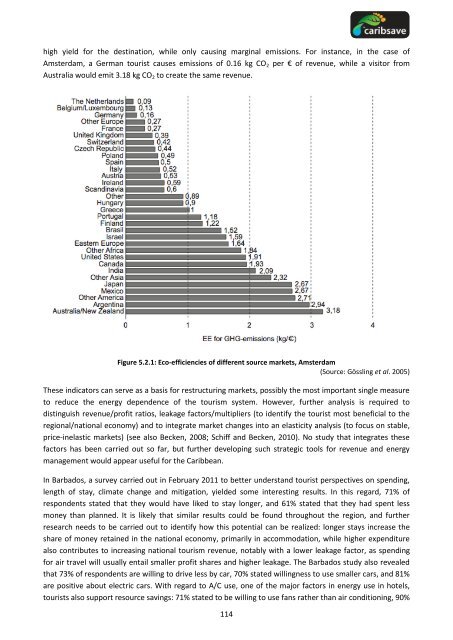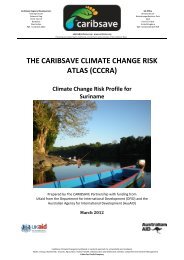Create successful ePaper yourself
Turn your PDF publications into a flip-book with our unique Google optimized e-Paper software.
high yield for the destination, while only causing marginal emissions. For instance, in the case of<br />
Amsterdam, a German tourist causes emissions of 0.16 kg CO2 per € of revenue, while a visitor from<br />
Australia would emit 3.18 kg CO2 to create the same revenue.<br />
Figure 5.2.1: Eco-efficiencies of different source markets, Amsterdam<br />
(Source: Gössling et al. 2005)<br />
These indicators can serve as a basis for restructuring markets, possibly the most important single measure<br />
to reduce the energy dependence of the tourism system. However, further analysis is required to<br />
distinguish revenue/profit ratios, leakage factors/multipliers (to identify the tourist most beneficial to the<br />
regional/national economy) <strong>and</strong> to integrate market changes into an elasticity analysis (to focus on stable,<br />
price-inelastic markets) (see also Becken, 2008; Schiff <strong>and</strong> Becken, 2010). No study that integrates these<br />
factors has been carried out so far, but further developing such strategic tools for revenue <strong>and</strong> energy<br />
management would appear useful for the Caribbean.<br />
In Barbados, a survey carried out in February 2011 to better underst<strong>and</strong> tourist perspectives on spending,<br />
length of stay, climate change <strong>and</strong> mitigation, yielded some interesting results. In this regard, 71% of<br />
respondents stated that they would have liked to stay longer, <strong>and</strong> 61% stated that they had spent less<br />
money than planned. It is likely that similar results could be found throughout the region, <strong>and</strong> further<br />
research needs to be carried out to identify how this potential can be realized: longer stays increase the<br />
share of money retained in the national economy, primarily in accommodation, while higher expenditure<br />
also contributes to increasing national tourism revenue, notably with a lower leakage factor, as spending<br />
for air travel will usually entail smaller profit shares <strong>and</strong> higher leakage. The Barbados study also revealed<br />
that 73% of respondents are willing to drive less by car, 70% stated willingness to use smaller cars, <strong>and</strong> 81%<br />
are positive about electric cars. With regard to A/C use, one of the major factors in energy use in hotels,<br />
tourists also support resource savings: 71% stated to be willing to use fans rather than air conditioning, 90%<br />
114





